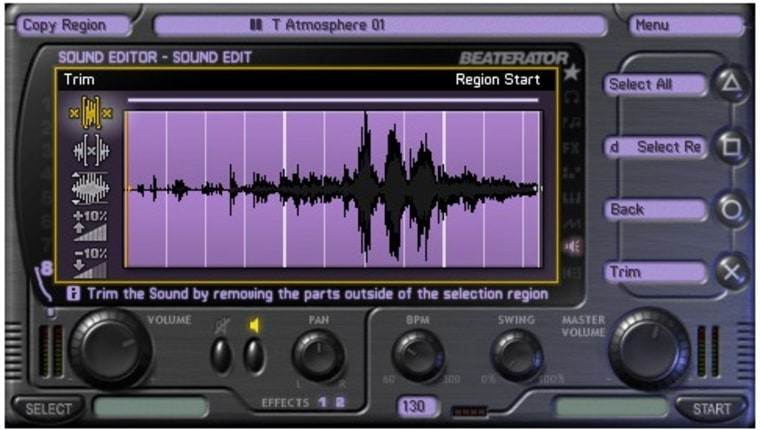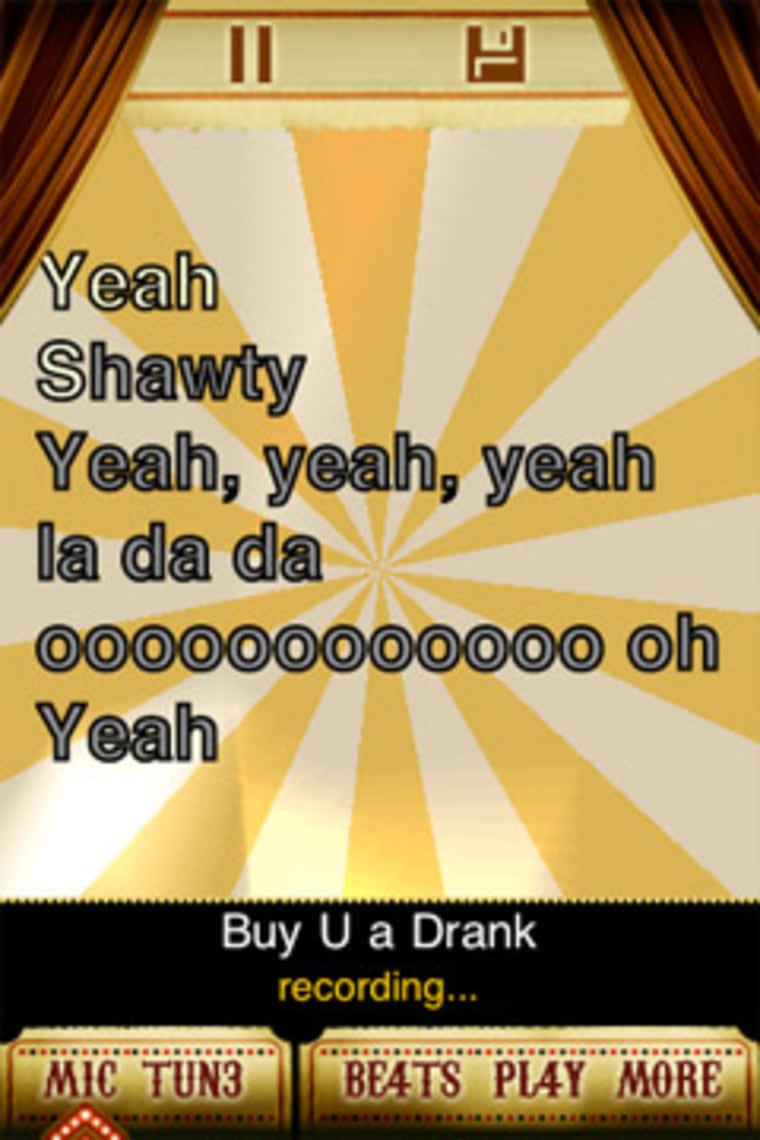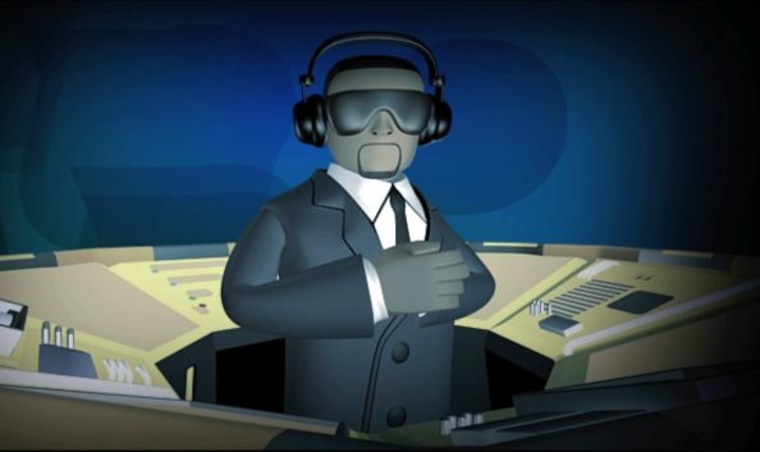My singing voice is so bad, I don’t even sing in the shower. And although I took years of piano lessons as a child, and though my parents and teachers insisted that I was at least somewhat musically inclined at the time, I can’t seem to remember how to plink out anything more challenging than “Heart and Soul” these days.
Despite my general lack of musical aptitude, I love music. I love listening to it. I love dancing to it. I love watching other people performing it. And as I watch others up there on stage, I occasionally fantasize about the rock star life I could have lived ... if only I’d learned to sing ... or maybe stuck with those piano lessons.
Well, at least I’ve got video games. And thankfully, these days, video games and some innovative entertainment applications are turning even the most musically moronic of us into musical geniuses. Or at least they’re giving it a real good try.
Take the new “Beaterator” game for the PSP and iPhone. It lets would-be electronic, hip-hop and pop artists try their hand at the craft of producing beats and building songs from scratch in a music studio. And then there’s the massively popular iPhone app "I Am T-Pain,” which turns even the sourest warblers into Auto-Tuning, pitch-perfecting, hip-hoppin’ sing-sations.
And that’s merely the beginning. Surf the App Store and you’ll find a rapidly expanding library of music-related games and applications. There is Brian Eno’s beautiful “Bloom” app which allows players to create their own ambient music soundscapes, and there’s “Melodica” which makes song creation as simple as touching a series of glowing boxes.
Yes, with the rise of the “Guitar Heroes” and “Rock Bands” and sundry variations on that theme (see “DJ Hero” arriving later this month) critics, Luddites and pretentious killjoys everywhere like to accuse these video games and various related digital trifles of cheapening the art and artistry of music and performance. But the truth of the matter is, video games are changing our relationship with music ... and they’re changing it for the better.
You too can grow up to be Timbaland
“I didn’t want to make ‘Beaterator’ like a traditional game,” says Timbaland, the Grammy-award winning record producer who has worked with everyone from Snoop Dogg to Bjork. “I tried to make something totally different from what’s out there.”

Timbaland joined forces with Rockstar Games to create “Beaterator,” which launched for the PSP last week and will be available for iPhones later this year. But calling “Beaterator” a “game” isn’t exactly accurate. There’s little in the way of traditional video gaming to be found here.
You won’t, for example, find yourself tapping color-coded keys on a faux instrument to the beat of pre-recorded music (a la “Guitar Hero.”) Instead, this application turns your hand-held game machine into a surprisingly powerful music creation device — a drum machine, synthesizer, mixer and recording studio in the palm of your hand.
The game comes with thousands of sounds and loops created by Timbaland and Rockstar, and it gives you various intuitive ways to put it all together to make your own unique beats and songs.
The Live Play mode is a quick way to jump into things, enabling even the most novice player to layer one ready-made loop atop another to create lush electronic, pop, rock and hip-hop orchestrations. But the real meat of “Beaterator” is found in the Studio and Song Crafter modes, which let players experiment with creating their own loops, recording their own vocals, layering on effects and fully arranging their own distinctive songs. Players can then export their creations and share them with others.
All in all, I found “Beaterator” absolutely absorbing. Layering track upon track, building drumbeats and various instrumental sounds, crafting my own songs and hearing them played back — for someone who’s never done anything like this before, it was a thrilling and eye-opening experience. And though “Beaterator” can get pretty deep pretty quickly, it did a reasonably good job of holding my hand and walking me through the meticulous music-making process.
Timbaland says he hopes this game will give people some genuine insights into what he does as a musician and a producer.
“What they’re going to get out playing ‘Beaterator’ is a lot of fun, but they’ll also understand the depth of making a beat and understand that it’s not so easy,” he says. “They’ll understand the process and the thought that’s behind making a beat.”
We are T-Pain
When it comes to making music, if there’s one thing I really wish I could do: I wish I could sing.
I envy those people who walk around with a musical instrument built into them. I’ve never been able to carry a tune and, early on, knowing that I couldn’t sing left me too embarrassed to try to actually learn how to sing. (Yeah, I’m the person who’s just mouthing the words to “Happy Birthday” when everyone else at the party is singing it.)

Which brings me to the beautiful thing about hip-hop star T-Pain’s “I Am T-Pain” iPhone app — even I can’t sing badly when I’m using it.
T-Pain partnered with the app stars at Smule (the guys who brought us the clever musical applications “Ocarina” and “Leaf Trombone”) to create a program that turns your phone into an Auto-Tuning microphone. In case you’ve somehow missed it, Auto-Tuning is an effect that’s been used (and overused) by pop, rap and hip-hop stars for years. It’s an effect that makes it so wayward vocals are “tuned” to the right pitch. And when the effect is tweaked, it makes singers sound like crooning robots.
But while some believe Auto-Tuning is ruining music as we know it, I say yeah to any tool that makes music more accessible to the masses (and by “the masses” I mean me.) And “I Am T-Pain” does just that. Sing into your iPhone and suddenly your voice is Auto-Tuned just like the stars. And with this power in your hands, you can sing and record your own songs or you can sing along to various T-Pain hits.
And here’s the thing: I won’t sing in the shower, but run my voice through “I Am T-Pain” and suddenly even I’m belting out songs like “I’m Sprung” and “I’m N Luv (Wit A Stripper).” And I know what you’re saying — no one wants to hear me sing “I’m N Luv (Wit A Stripper).” But you know what? I’m going to sing it any way. Because, at long last, I can.
And that’s the great thing about games like “Beaterator” and apps like “I Am T-Pain” or “Bloom” and even games like “Guitar Hero” and “Rock Band.” They encourage us to think about music and, more importantly, to imagine ourselves at the center of it. They encourage us to do something we might not otherwise do — to try our hand at music making when perhaps making music seems like something only other people do. And as much as they may seem like trifling and sometimes silly little toys, they put modern music making within reach of us all.
As Timbaland says, “I tried to give people a game but I also tried to give people who love music hope of making their own music.”
Winda Benedetti thinks her tweets on Twitter would sound better if only she could Auto-Tune them.
